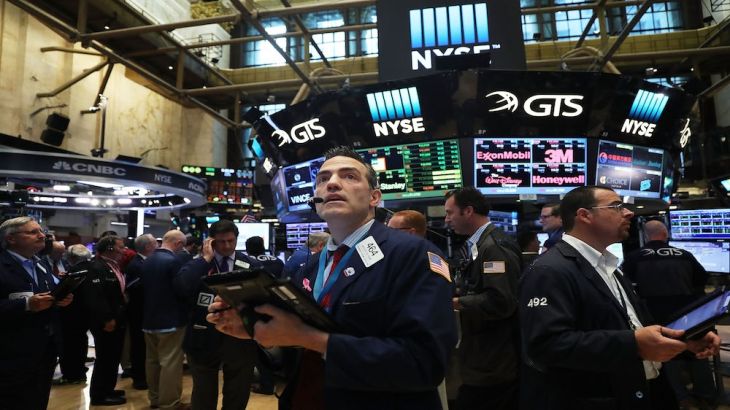
Brexit fallout: The global economic impact
After the UK’s Brexit vote, are we on the brink of a global recession?
The outcome of the EU referendum in Britain didn’t just shake up the United Kingdom, it also brought great uncertainty to the global markets.
The impact of the Brexit vote is becoming more and more apparent, and there is no telling when or where it might end.
Keep reading
list of 4 itemsUS imposes new sanctions on Iran after attack on Israel
A flash flood and a quiet sale highlight India’s Sikkim’s hydro problems
Why is Germany maintaining economic ties with China?
In many ways I am more worried by the current situation than I was back in 2008. Back at that time we knew the script .... The current situation is a lot more complex ... it's a shock to our political system, it's a shock to our institutional architecture, and there is massive uncertainty.
Counting the Cost is back on the trail of Brexit again this week, looking at where the money is moving around the world and why.
Gold is strong (it has gone up by more than 25 percent this year) and so is the US dollar. Government bonds – even with their low returns – are looking favourable too. And it’s all because of the huge uncertainty that the Brexit vote has thrown up.
The governor of the Bank of England, Mark Carney, has unveiled a plan to allow banks to release almost $200bn in funds to lend to home buyers and businesses, but he also warned there is a limit to what his organisation can do to ease the economic uncertainty.
“The UK has entered a period of uncertainty and significant economic adjustment. The efforts of the Bank of England will not be able to fully and immediately offset the market and economic volatility that can be expected while this adjustment proceeds,” Mark Carney said.
So what is next for the UK and the world? Are we on the brink of a global recession?
Our guest Russell Jones from economics firm Llewellyn Consulting says he is more nervous about the economic outlook now, that he was back in 2008 when the financial crisis hit. So is it all the start of more bad news for the global economy?
Uncertainty at India’s Reserve Bank
In uncertain times, central banks have an important role to play in keeping the economy on track, and India’s Raghuram Rajan is regarded as one of the world’s most impressive central bankers.
He has been credited with bringing stability to India’s economy since his appointment as the Reserve Bank of India’s head in 2013. But he has also faced criticism from a faction within President Narendra Modi’s ruling party for keeping interest rates high, and over a perception that he has started to stray into politics.
He has announced that he will step down, so what’s next to India’s economic path, and was Raghuram Rajan as effective to India’s economy?
Faiz Jamil investigates for Counting the Cost and we talk to Rajiv Biswas, Asia-Pacific chief economist at HIS.
Global Entrepreneurship Summit 2016
Hosted by the White House and US State Department, and held at Stanford University in Palo Alto, the Global Entrepreneurship summit (GES) 2016 aimed to bring together hundreds of entrepreneurs and investors from all over the world – putting all the right people in the right place to make business opportunities happen.
Kamahl Santamaria and reporter Tarek Bazley take us around the summit to meet some of the people looking for their big break.
Kamahl also interviews Maria Contreras-Sweet, the administrator of the US Small Business Administration, about the challenges and inequalities that exist in the entrepreneurship world, and he visits the garage in Los Altos where, 40 years ago, Steve Jobs founded the company we now know as Apple.
![The gerage in Los Altos where Steve Jobs founded Apple 40 years ago [Kamahl Santamaria / Al Jazeera]](/wp-content/uploads/2016/07/daf84203052b4c6a8a88c4f8e0c526c9_18.jpeg)